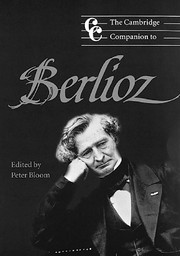Book contents
- Frontmatter
- Introduction: Berlioz on the eve of the bicentenary
- Part I Perspectives
- Part II Principal compositions
- Part III Major writings
- Part IV Execution
- Part V Critical encounters
- 14 Berlioz and Gluck
- 15 Berlioz and Mozart
- 16 Berlioz and Beethoven
- 17 Berlioz and Wagner: Épisodes de la vie des artistes
- Part VI Renown
- Notes
- Bibliography
- Index
16 - Berlioz and Beethoven
from Part V - Critical encounters
Published online by Cambridge University Press: 28 September 2011
- Frontmatter
- Introduction: Berlioz on the eve of the bicentenary
- Part I Perspectives
- Part II Principal compositions
- Part III Major writings
- Part IV Execution
- Part V Critical encounters
- 14 Berlioz and Gluck
- 15 Berlioz and Mozart
- 16 Berlioz and Beethoven
- 17 Berlioz and Wagner: Épisodes de la vie des artistes
- Part VI Renown
- Notes
- Bibliography
- Index
Summary
In the reminiscences of Berlioz which he addressed to Eduard Hanslick in the Revue et Gazette musicale ten years after the composer's death, Stephen Heller recalled his friend's response to a performance of Beethoven's E-Minor Quartet (the second “Rasumovsky”), which they attended together in the eighteen-sixties:
During the adagio there was a look of rapture, of ecstasy on his face; it was as if he had experienced a “transubstantiation.” One or two other fine works still remained to be played at the concert, but we didn't wait for them. I accompanied Berlioz to his door. On the way no word was exchanged between us: we were still hearing the Adagio and its sublime prayer. As I said good-bye he took my hand and said: “That man had everything … and we have nothing!”
To that anecdote we may add Berlioz's account of a rehearsal of a late Beethoven quartet, perhaps Op. 127, which was in the repertory of the Bohrer Quartet when they played in Paris in February and March 1830:
To my mind Anton Bohrer feels and understands the popularly supposed eccentric and unintelligible works among Beethoven’s output as few men do. I can see him now, at quartet rehearsals,with his brother Max (the well-known cellist, now in America), Claudel, second violin, and Urhan, viola, in ardent support. Max, at the strains of this transcendental music,would smile with the sheer pride and delight of playing it; he had the relaxed, contented air that comes from breathing one’s native element. Urhan worshipped in silence, eyes averted as though from the radiance of the sun; he seemed to be saying,“God willed that there should be a man as great as Beethoven, and that we should be allowed to contemplate him. God willed it.” Claudel admired the others for the depth of their admiration. But with Anton Bohrer, the first violin, it was a sublime passion, an ecstasy of love.
- Type
- Chapter
- Information
- The Cambridge Companion to Berlioz , pp. 223 - 234Publisher: Cambridge University PressPrint publication year: 2000

